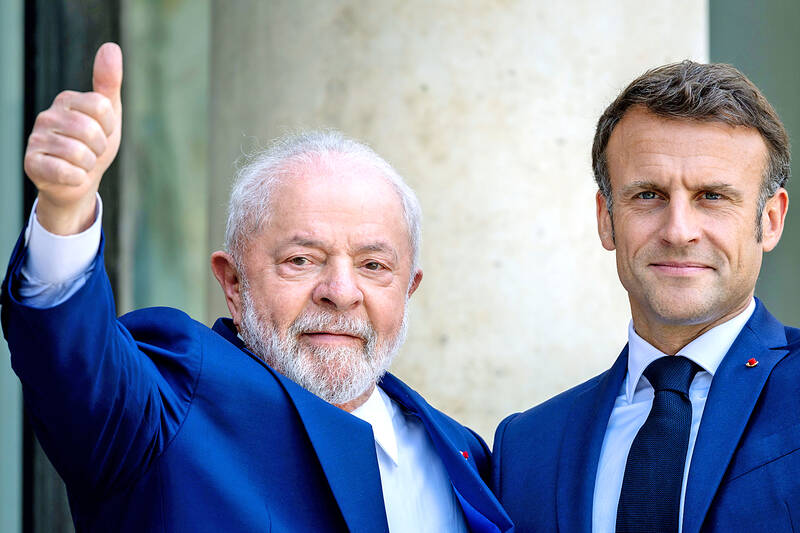A global climate summit wrapped up on Friday with leaders agreeing that the international financial system was woefully inadequate in an era of global warming, after taking a number of small steps to helping debt-burdened developing nations.
While host country France pitched the conference as a consensus-building exercise, leaders were under pressure to produce clear outcomes from the two-day meeting as economies stagger under growing debt after successive crises over the past few years.
The summit comes amid warnings that the world’s ability to curb global warming is reliant on a massive increase in clean energy investment in developing countries.

Photo: EPA-EFE
French President Emmanuel Macron hailed a “complete consensus” to reform global financial institutions and make them “more efficient, fairer and better suited to the world of today.”
About 40 national leaders gathered in Paris, most from developing countries whose economies have been buffeted by crises in recent years, including COVID-19, Russia’s invasion of Ukraine, soaring inflation and extreme weather events.
The conference heard time and again that the nearly 80-year-old financial system — underpinned by the World Bank and the IMF — was no longer fit-for-purpose in facing 21st century challenges.
“With this mechanism, the rich are always rich and the poor are always poor,” Brazilian President Luiz Inacio Lula da Silva said.
While there was agreement on the broad outlines of the problem, there was less progress on steering the global financial juggernaut in a new direction, although there were several incremental initiatives and advancements on existing promises.
World Bank President Ajay Banga on Thursday said the lender would introduce a “pause” mechanism on debt repayments for countries hit by a crisis so they could “focus on what matters.”
One key announcement came from IMF Managing Director Kristalina Georgieva, who said a pledge to shift US$100 billion of liquidity-boosting “special drawing rights” into a climate and poverty fund had been met.
Overall, the progress made was “not sufficient,” said Friederike Roder, vice president of global advocacy at Global Citizen, adding that the IMF target included a US pledge of US$21 billion that is stuck at the US Congress.
However, she said the meeting had managed to “totally change the conversation” on tough issues that have up to now been mostly kicked into the long grass.

The CIA has a message for Chinese government officials worried about their place in Chinese President Xi Jinping’s (習近平) government: Come work with us. The agency released two Mandarin-language videos on social media on Thursday inviting disgruntled officials to contact the CIA. The recruitment videos posted on YouTube and X racked up more than 5 million views combined in their first day. The outreach comes as CIA Director John Ratcliffe has vowed to boost the agency’s use of intelligence from human sources and its focus on China, which has recently targeted US officials with its own espionage operations. The videos are “aimed at

STEADFAST FRIEND: The bills encourage increased Taiwan-US engagement and address China’s distortion of UN Resolution 2758 to isolate Taiwan internationally The Presidential Office yesterday thanked the US House of Representatives for unanimously passing two Taiwan-related bills highlighting its solid support for Taiwan’s democracy and global participation, and for deepening bilateral relations. One of the bills, the Taiwan Assurance Implementation Act, requires the US Department of State to periodically review its guidelines for engagement with Taiwan, and report to the US Congress on the guidelines and plans to lift self-imposed limitations on US-Taiwan engagement. The other bill is the Taiwan International Solidarity Act, which clarifies that UN Resolution 2758 does not address the issue of the representation of Taiwan or its people in

US Indo-Pacific Commander Admiral Samuel Paparo on Friday expressed concern over the rate at which China is diversifying its military exercises, the Financial Times (FT) reported on Saturday. “The rates of change on the depth and breadth of their exercises is the one non-linear effect that I’ve seen in the last year that wakes me up at night or keeps me up at night,” Paparo was quoted by FT as saying while attending the annual Sedona Forum at the McCain Institute in Arizona. Paparo also expressed concern over the speed with which China was expanding its military. While the US

SHIFT: Taiwan’s better-than-expected first-quarter GDP and signs of weakness in the US have driven global capital back to emerging markets, the central bank head said The central bank yesterday blamed market speculation for the steep rise in the local currency, and urged exporters and financial institutions to stay calm and stop panic sell-offs to avoid hurting their own profitability. The nation’s top monetary policymaker said that it would step in, if necessary, to maintain order and stability in the foreign exchange market. The remarks came as the NT dollar yesterday closed up NT$0.919 to NT$30.145 against the US dollar in Taipei trading, after rising as high as NT$29.59 in intraday trading. The local currency has surged 5.85 percent against the greenback over the past two sessions, central